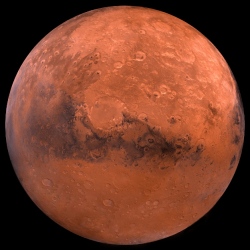
Scientists have discovered evidence of an ancient lake that likely represents some of the last potentially habitable surface water ever to exist on Mars. The study, published online in Geology, examined an 18 sq. mile chloride salt deposit in Meridiani Planum, the location of NASA’s Opportunity rover.
“This chloride deposit likely formed from fluvio-lacustrine processes, implying an active hydrologic cycle. Late-stage activity led to valley incision in the surrounding highlands and ponding of water to form a lake in a local basin,” Dr Hynek and co-authors said.
“The lake level eventually rose and breached the drainage divide, leading to significant outflow. The remaining water evaporated and eventually precipitated the chlorides at the lowest levels.”
Digital terrain mapping and mineralogical analysis of the features surrounding the deposit indicate that this one-time lakebed is no older than 3.6 billion years old, well after the time period when Mars is thought to have been warm enough to sustain large amounts of surface water planet-wide.
“This was a long-lived lake, and we were able to put a very good time boundary on its maximum age. We can be pretty certain that this is one of the last instances of a sizeable lake on Mars,” Dr Hynek said.
Based on the extent and thickness of the salt, Dr Hynek and his colleagues estimate that the lake was only about 8% as salty as the Earth’s oceans and therefore may have been hospitable to microbial life.
